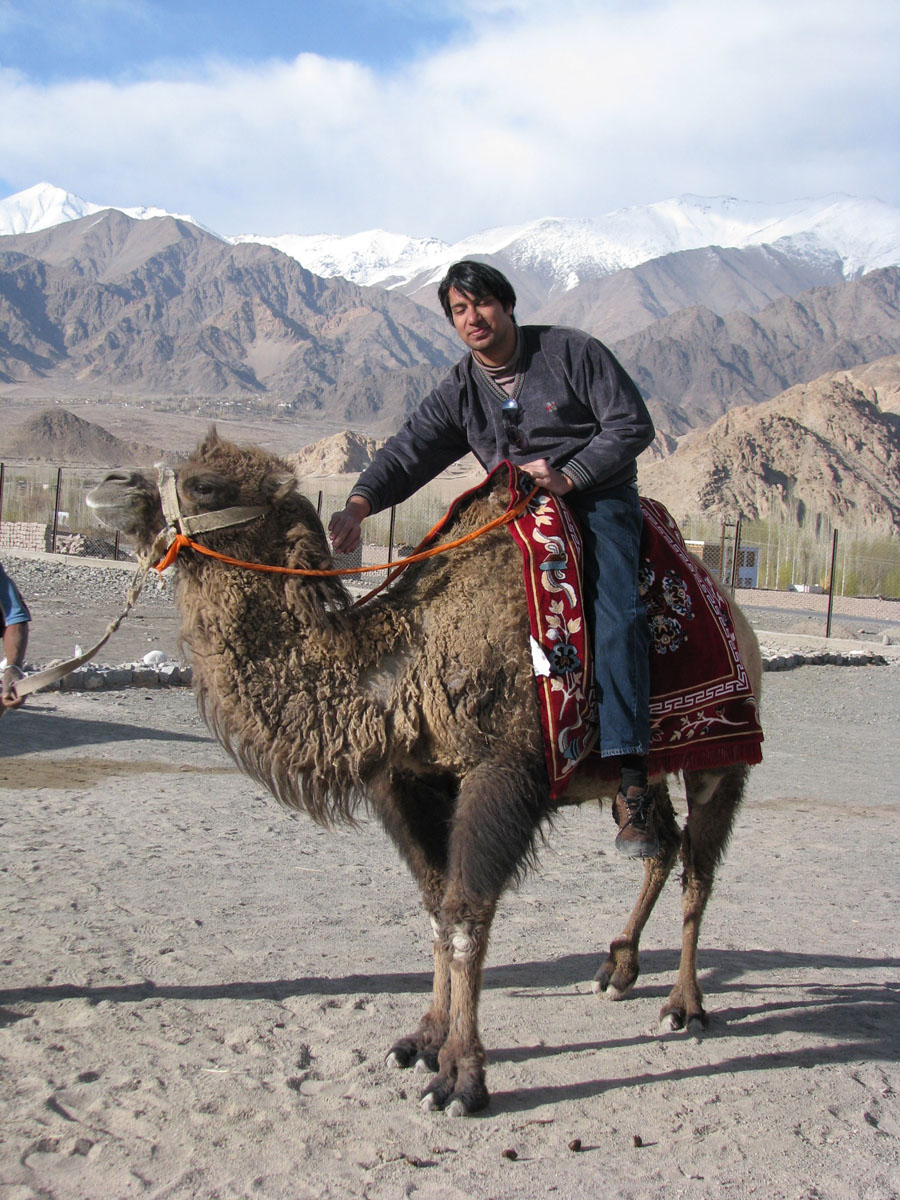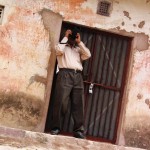
Travel India Leh III
Enigmatic land of Sand and Snow
the reader east of Leh to Changla Pass and Pangong Lake.
In the second part, I wrote about some wonderful places West of Leh.
In this part, I am writing about Khardung La, the highest motorable road in the world to the North of Leh and the unbelievably beautiful Nubra Valley beyond.
I am also writing about the beautiful Tsomoriri Lake, and Dhahanu, the Land of the purest surviving Aryans to the South of Leh
the Karakoram and Ladakh ranges of the Himalayas.
The average altitude of the valley is 10,000 feet above sea level. The Nubra Valley was opened to tourists only in 1994. It is a fascinating place.
The road to Nubra Valley passes over Khardung La pass 18,390 feet, or 5602 metres, above sea level. This is the highest motorable road in the world.
We almost reached the pass, but found the road blocked by an errant truck which like the proverbial mule had suddenly decided it was time to stop and block the entire traffic.
by an errant truck which like the proverbial mule had suddenly decided it was time to stop and block the entire traffic.
So we got out and played around in the ice and snow.
We met two motor cyclists who had driven all the way from Bangalore covering more than 5,000 kms.
Even they had to turn back.
The Diskit Monastery, perched on an overhanging rock next to a stream, was founded
The Shayok and Saichen Rivers drain the Nubra Valley.
You journey will take you through pretty villages, green farms, myricaria, willow and poplar trees.
These are just like the sand dunes of Rajasthan.
You can even take a ride on a bacterian (double humped) camel from Deskit to Hunder village lasting about two hours.
You can visit the King’s palace and the monastery in Hunder.
There are a number of hot springs on the right of the road just before you enter the village.
Dhahanu – land of the pure Aryans (163 Kms from Leh)
Dhahanu is situated to the south west of Leh, and being on a lower altitude, Dhahanu is warmer than Leh.
There are many small villages – but only two villages – Dha and Hanu are open to tourists.
Their culture and religious practices are very similar to ancient pre- Buddhist religion known as Bon.
Tsomoriri Lake (137 Kms from Leh)
The valley is inhabited by a small scattered population of “Changpas” nomadic shepherds.
It has about 35 resident monks.
A kilometre ahead of Tsomoriri lake is the picturesque village of Korzok consisting of about a hundred families.
The area is rich in wildlife including the wild ass, black necked cranes and geese which flock to the lake side for breeding during the summer months.
You should stay overnight at the lake.
Ladakh is the trekkers’ paradise.
You can ask your hotel or the local agents to organise all kinds of treks – from simple two day affairs to the most difficult treks extending over three weeks.
Tibetan Medicine
Tibetan medicine is an ancient system of medicine based on the Indian Buddhist system of medicine developed by Buddha himself some 2500 years ago.
This indigenous health care system plays an important role in the health care
of Ladakhi communities. In Ladakh, the practitioners of this system are known as ‘Amchi’.
The skills are generally passed down from father to son or daughter within the village.
There are many Amchis who are the sixth generation.
This is known as the rGYUTPA lineage.New Amchis have to take their passing out examination orally in front of the whole village.
They are examined by a panel of senior Amchis from surrounding villages.
Quite often, they are also strong community leaders or Village Heads.
They are usually quite knowledgeable even in Astronomy and Astrology.
In return, the villagers respect the Amchis and help them with their agricultural activities and offerings.
The Oracle
The oracle (both male and female) is something like a soothsayer.
If you have any disease, they will conduct a healing.
If you have any questions, they will advise you. You can request your hotel or travel agent to arrange a session with an Oracle.
The Oracle at Thikse Monastery, a villager with supernatural powers, a miraculous healer and predictor of the future, is considered to be the most powerful oracle in Ladakh.
Leh was on the middle of the best trade route between Punjab and Central Asia.
During its hey days, caravans carried textiles, spices, silk, carpets, dyestuffs and narcotics.
The goods were transported through relays of pony transporters who took about two months to transport the goods from Amritsar to the Central Asian towns of Yarkand and Khotan, or vice versa
.
Leh was a bustling entrepot, with bazaars thronged with merchants from far countries.
A Legend and Folklore
Chovang Namgyal, one of the richest and powerful kings of Ladakh died in 1600 without a male heir.
His younger brother, Jamya Namgyal, succeeded him and ascended the throne.
Alimir, the Mir of Skardo, attacked Leh and captured it.
He took Jamya Namgyal as prisoner. But the Mir’s daughter fell in love with the king and became pregnant.
The Mir married his daughter to Jamya Namgyal.
The oracles prophesied that the daughter would give birth to a
very strong and powerful king.
So Jamya Namgyal became king once again.
And his son became a great ruler.
Permits
Both Indians and foreigners need permits to visit the distant places of Ladakh.
These are easily obtained in one day.
Your hotel will get them for you.


Pingback:Ladakh » Ladakh travel roads and description
Great site. Good info
If you have to do it, you might as well do it right
I want to say – thank you for this!
viagra
I want to say – thank you for this!
Very interesting site. Hope it will always be alive!
Incredible site!
xanax
Hi there very nice web site!! Man .. Excellent ..
Superb .. I will bookmark your blog and take the feeds additionally?
I’m glad to find a lot of useful information here within the submit,
we want work out more strategies on this regard, thank you for sharing.
. . . . .
I’m new to building websites and I was wanting to know if having your blog title related to your articles and other content really that critical? I notice your title, “Travel India Leh III | Travel India Guide ” does appear to be spot on with what your website is about however, I prefer to keep my title less content descriptive and based more around site branding. Would you think this is a good idea or bad idea? Any kind of assistance would be greatly valued. Kindest regards www